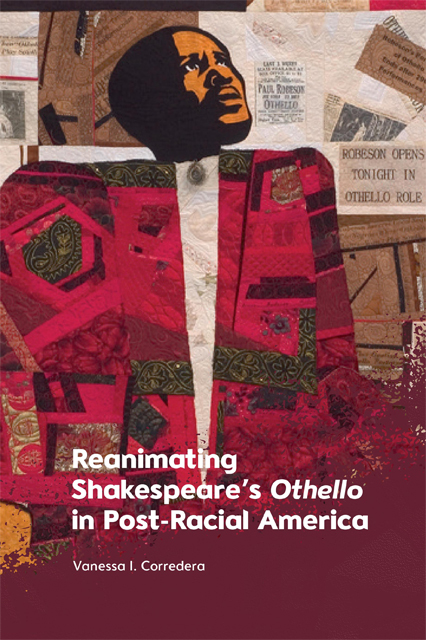Book contents
- Frontmatter
- Contents
- Acknowledgments
- Permissions
- Introduction
- 1 Images of Objectification: Othello as Prop in Kill Shakespeare
- 2 Colorblindness on the Post-Racial Stage: Hip Hop, Comedy, and Cultural Appropriation in Othello: The Remix
- 3 Othello, Race, and Serial: The Ethics of a Shakespearean Cameo
- 4 “No tools with which to hear”: Adaptive Re-Vision, Audience Education, and American Moor
- 5 At the Intersection of Gender, Race, and White Privilege: A Case of Three Desdemona Plays
- 6 Resisting Lobotomized Shakespeare: Whiteness and Universality in Key & Peele and Get Out
- Epilogue
- Bibliography
- Index
5 - At the Intersection of Gender, Race, and White Privilege: A Case of Three Desdemona Plays
Published online by Cambridge University Press: 25 October 2023
- Frontmatter
- Contents
- Acknowledgments
- Permissions
- Introduction
- 1 Images of Objectification: Othello as Prop in Kill Shakespeare
- 2 Colorblindness on the Post-Racial Stage: Hip Hop, Comedy, and Cultural Appropriation in Othello: The Remix
- 3 Othello, Race, and Serial: The Ethics of a Shakespearean Cameo
- 4 “No tools with which to hear”: Adaptive Re-Vision, Audience Education, and American Moor
- 5 At the Intersection of Gender, Race, and White Privilege: A Case of Three Desdemona Plays
- 6 Resisting Lobotomized Shakespeare: Whiteness and Universality in Key & Peele and Get Out
- Epilogue
- Bibliography
- Index
Summary
Othello’s Desdemona Problem
“[I]nnocent, and sweet, and passive” (67). This is how lauded postcolonial Nigerian author Ben Okri describes Desdemona in his essay “Leaping Out of Shakespeare’s Terror: Five Meditations on Othello” (1997). As Okri meditates on the often evaded “terrors that are at the heart of the play” (59) after watching director Terry Hands’s Othello starring Ben Kingsley and David Suchet at the Barbican, in the fourth and fifth sections he turns to the general’s “general” and the way that the white, patriarchal powers shaping her worldview doom her and Othello’s love from the outset. For Okri, Desdemona is a young woman loving but ignorant, devoted but sheltered. “She is,” he explains, “the redemption and the victim of her history.” What is this history? Okri never articulates it, and neither does Shakespeare’s play. Yet even without its details, Okri understands that Desdemona is
the type who likes romances and is seduced by exoticism. Today she might be an ardent lover of a glamorized Africa … She would have heard of slavery but never have thought about it. She would be shocked to hear that black people are treated badly because of their color … She would be shocked because she has never been allowed to confront reality, to face the Medusa-like truths of the world. (67)
How can Okri make these assertions without access to the very history he says shapes Desdemona? He can articulate these claims because Desdemona’s history is part of another history, one pervasive and well-known—that of white patriarchal control over the female body and mind. Okri never mentions patriarchal restrictions explicitly, but he implies them as he recognizes what Desdemona “has never been allowed.” Whether applied to Shakespeare’s Desdemona or the one Okri imagines for today, the protective sheltering of young white womanhood from the vagaries of the world depends upon a desire for silence, chastity, and obedience, for it is only through careful cultivation and protection by patriarchy that innocent, sweet, and passive femininity can endure.
According to Okri, such patriarchal circumscription serves to maintain a particular perspective, one that does not acknowledge or truly confront racial inequity.
- Type
- Chapter
- Information
- Reanimating Shakespeare's Othello in Post-Racial America , pp. 206 - 252Publisher: Edinburgh University PressPrint publication year: 2022

